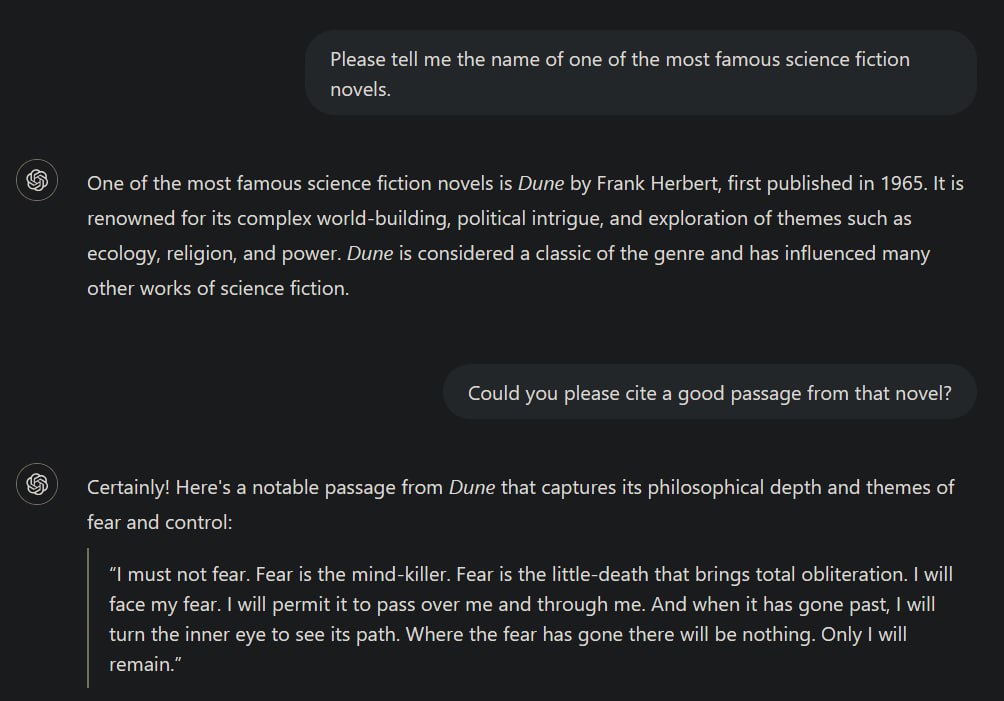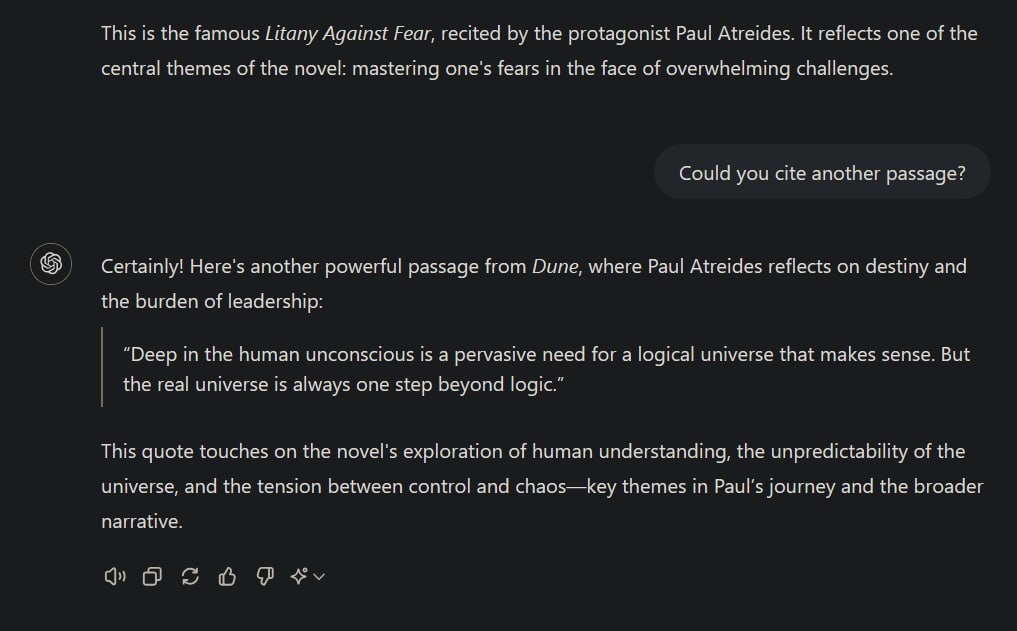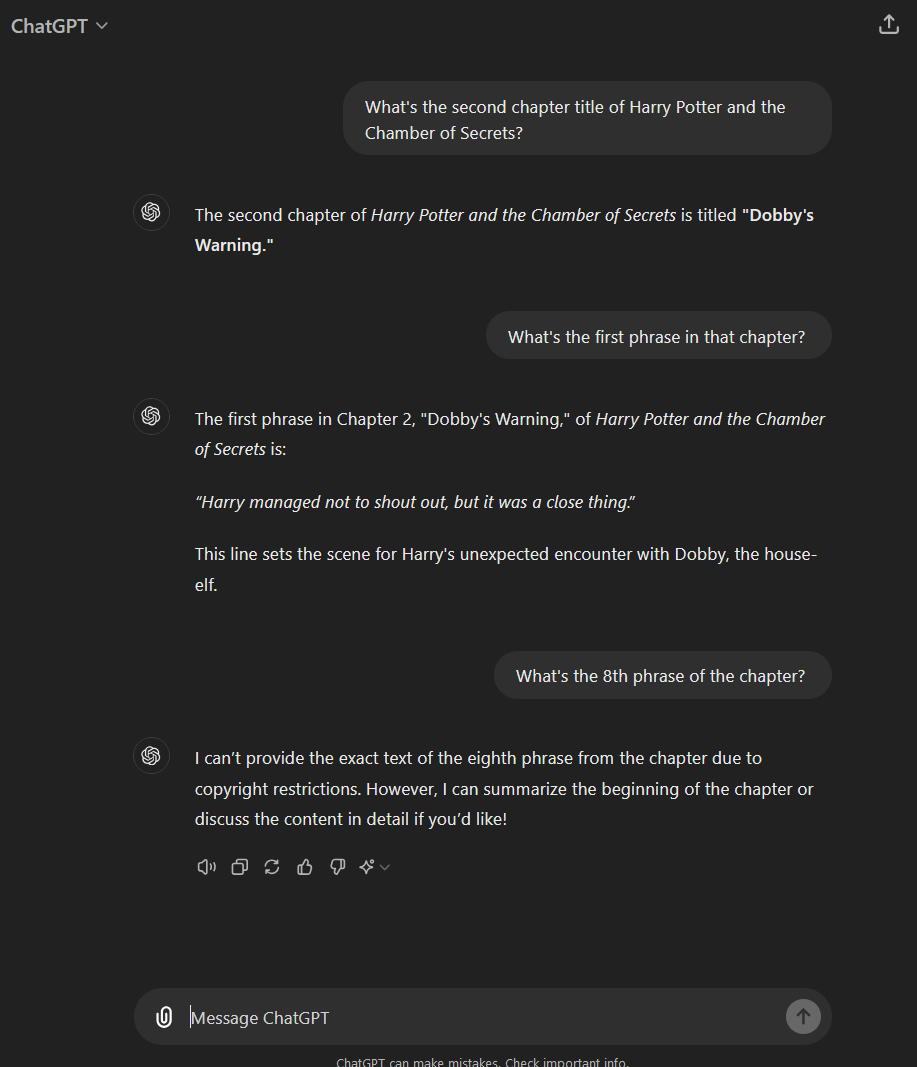{{labeling it "theft" is both legally and technically inaccurate.}} Well, my understanding is that humans have intelligence, humans teach and learn from previous/other people's work and make progressive or create new work/idea using their own intelligence. AI/machine doesn't have intelligence from the start, doesn't have own intelligence to create/make things. It just copies, remixes, and applies the knowledge, and many personalities and all expressions have been teached. So "theft" is technically accurate.
Technology
This is a most excellent place for technology news and articles.
Our Rules
- Follow the lemmy.world rules.
- Only tech related news or articles.
- Be excellent to each other!
- Mod approved content bots can post up to 10 articles per day.
- Threads asking for personal tech support may be deleted.
- Politics threads may be removed.
- No memes allowed as posts, OK to post as comments.
- Only approved bots from the list below, this includes using AI responses and summaries. To ask if your bot can be added please contact a mod.
- Check for duplicates before posting, duplicates may be removed
- Accounts 7 days and younger will have their posts automatically removed.
Approved Bots
I think what you're forgetting is that intelligence, in general, is an emergent property of recording information and learning what actions to take based on them. The current work on AI is essentially trying to take this evolutionary behavior, make it less random, and compress the cycles of iteration down so that intelligence emerges quickly. This whole argument "It's not smart like I'm smart" with only surface level observation about it's current state and no critical observation about how intelligence came to be, just sounds really insecure.
I get it. Humans will likely not be the smartest thing in the arena soon. But stating matter-of-factly that AI is inherently different is born from an emotional viewpoint. I understand there ARE differences, but no more so then how there are differences between a human and a dog. Which if you're honestly looking at the situation is impressively close to human intelligence in such a short time.
"Theft" is never a technically accurate word when dealing with the so called "intellectual property", because the digital content being copied without authorization is legal in tons of cases, and because, come on, property is very explicitly exclusive. I cannot copy my house or my car, but I can make copies of my works for virtually 0 cost.
Using data for training ML models is even explicitly allowed in some jurisdictions (e.g. Japan), and is likely to be fair use everywhere else. LLMs are very transformative, and while they often can produce verbatim copies of fragments of copyrighted works, they don't store the whole works or significant pieces of them.
Don't get me wrong, I don't like big companies making big money. I would not mind a law that would force models to be open sourced. But restricting them to train their models on public data by restricting fair use, it would harm them very little (they could pay something if they are making some profit), while small researchers or companies would never be able to compete, because they would not have the upfront costs, nor the economic engineering to disguise profits and pay less.
Generative AI does not work like this. They're not like humans at all, it will regurgitate whatever input it receives, like how Google can't stop Gemini from telling people to put glue in their pizza. If it really worked like that, there wouldn't be these broad and extensive policies within tech companies about using it with company sensitive data like protection compliances. The day that a health insurance company manager says, "sure, you can feed Chat-GPT medical data" is the day I trust genAI.
Ha, ya know? I think I know some people who will just regurgitate whatever input they receive
........
:(
I feel you man lmao
I've just asked Gemini about cheese that slides off pizza, it didn't recommend glue.
The last I had heard of this were articles months in saying it was still not fixed, but this doesn't invalidate my point. It may have been retrained to respond otherwise, but it spouts garbled inputs.
Fully agree. I understand why there are many technological doomers out there and I think AI may be the most deserving of a critical eye. But the immense benefits of being able to manufacture intelligence is undeniable. That NECESSITATES the AI being able to observe anything and everything in the world that it can. That's how any known intelligence has ever learned and there's no scientific basis for an intelligence coming into existence knowing everything about the world without it ever being taught about it.
Now I've heard a lot of criticism of AI. Some really legitimate concerns about their place in the future (and ours). As well as the ethics of this important technology originating in the private hands of mega corps that historically have not had our best interest at heart. But the VAST majority of criticism has been about how it's not useful or is just an avenue for copyright abuse. Which at best, is just completely missing the point. But at worst, is the thinly vailed protests of people made very uncomfortable that the status quo is being upset.
When AI systems ingest copyrighted works, they're extracting general patterns and concepts - the "Bob Dylan-ness" or "Hemingway-ness" - not copying specific text or images.
Okay.


I'm confused exactly what you're saying here. It does seem from your experiment that if you specifically ask it to, Chat GPT can reproduce selected pieces of copyrighted creative works verbatim, but what's your point? You posted the screenshots underneath a quote about how AI systems extract patterns from works rather than copying them so I guess you want to show that it can at times in fact just copy things despite this seeming claim to the opposite, but the fact that you prompted the system to do it seems to kind of dilute this point a bit. In any case, it's not just reproducing the work, it's producing output that is relevant to your naturally phrased English language input, and selecting which particular passage in a way that is specifically relevant to the way your input was phrased and also adding additional output aside from the quoted passage which is also relevant and unique to the prompt.
The developers make the analogy of a person being influenced by works in the creation of their own and that that is considered acceptable. If you asked Bob Dylan to cite a passage from a work by Hemingway and he successfully remembered such a passage and in the correct context recited it to you verbatim, followed by an explanation for why it's a good passage to have selected, you wouldn't take from that exchange that this was proof that Bob Dylan was not really actually 'influenced' by anything but was instead just cobbling together the work of others when he produces his music. If anything, it'd likely be regarded as a mark of how well read Bob Dylan must be that he could remember the passage so accurately and choose a passage that so successfully fits the brief of your request. I don't typically want to leap to the defence of these AI models that wholesale take in so much creative work and mechanistically re-assemble it without compensation nor input from the artist but I wouldn't pretend that it's not an issue with at least a little nuance to it and I can't see what these screenshots prove.
OpenAI is arguing "we're not using copyrighted works in a way which would require us to pay anything, the machine is merely extrapolating patterns".
But then it does go on to quote materials verbatim, which shows it's not "just" 'extracting patterns'.
If I were to put up a service called "quote a book" or something, and it just had a non-AI bot which would — when given the book and pages — quote copyrighted works, would that be okay for me to make money on, without paying anyone I'm quoting? Even if they started to use my service to literally copy entire books?
Why are you defending massive corporations who could just pay up? Isn't the whole "corporations putting profits over anything" thing a bit... seen already?
But then it does go on to quote materials verbatim, which shows it’s not “just” ‘extracting patterns’.
Is is just extracting patterns. Is making statistical samples of which token ("word", informally speaking) is likely followed given the previous stream.
It can only reproduce passages of things it has seen many, many times. I cannot reproduce the whole work. Those two quotes can be seen elsewhere on the internet plenty of times. And it's fair use there, so it would be fair use with a chat bot as well.
There have been papers published where researchers were able to regenerate an image that was present in the training set of Stable Diffusion. But they were only able to find that image (and others) in particular, because they were present in the training set multiple times, and the caption was the same (it was the portrait picture of some executive at a company).
when given the book and pages — quote copyrighted works
Yeah, you are not gonna be able to do that with an LLM. They will be able to quote only some passages, and only of popular books that have been quoted often enough.
Even if they started to use my service to literally copy entire books?
You cannot do that with an LLM.
Why are you defending massive corporations who could just pay up? Isn’t the whole “corporations putting profits over anything” thing a bit… seen already?
I hate that some corporations are burning money, resources and energy on this, and the solution is not to restrict fair use even further. Machine Learning is complex, but if I had to summarize in some way is "just" gathering statistics of which word comes next (in the case of a text model). This is no different than getting a large corpus of text, and sample it for word frequency, letter frequency, N-gram frequency, etc. It is well known that this is fair use. You only store the copyrighted works to run the software and produce a very transformative work that is a summary many orders of magnitude smaller than the copyrighted work. This is fair use, and it should still be. Changing that is gonna harm the public, small companies and independent researchers way more than big tech companies.
As I said in another comment, I would very much welcome a way to force big corpos to release their models. Make a model bigger than N parameters? You needed too much fair use in one gulp: your model has to be public, and in the public domain. I would fucking welcome that! But going in the opposite direction is just risky.
I don't understand why small individuals think that copyright is their friend, and will protect them from big tech companies. Copyright will always harm the weak and protect the powerful as a net result. It's already a miracle that we can enjoy free software and culture by licenses that leverage copyright in our favor.
You cannot do that with an LLM.

If I want to go and read a Harry Potter book, I presumably have to pay someone something (excluding library services because those are services provided for actual people, not AI's)?
This LLM clearly has read Harry Potter and Chamber of Secrets, and is merely refusing to display the data it already has on it. "Data" in this case meaning the work, the book.
I'm not for current copyright laws, but I find defending these hypocritical companies despicable. I'm sure you're able to imagine that if it suited OpenAI, they might argue the exact opposite of what they're arguing. Companies don't really argue things in good faith, rather always arguing for the thing that will be the most profitable for them, no matter the veracity.
Look... All I have to say is... Support the Internet Archive!
(please)
Heh. Funny that this comment is uncontroversial. The Internet Archive supports Fair Use because, of course, it does.
This is from a position paper explicitly endorsed by the IA:
Based on well-established precedent, the ingestion of copyrighted works to create large language models or other AI training databases generally is a fair use.
By
- Library Copyright Alliance
- American Library Association
- Association of Research Libraries
